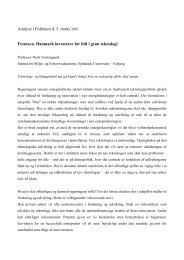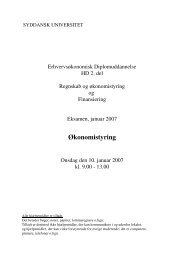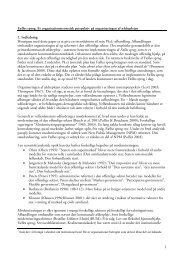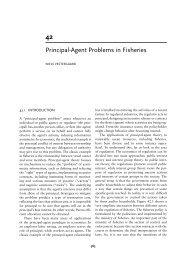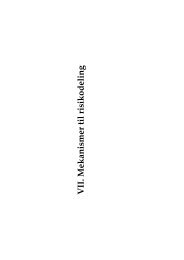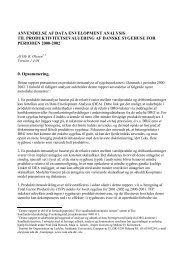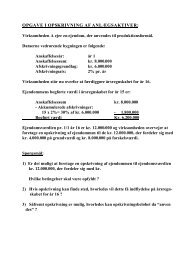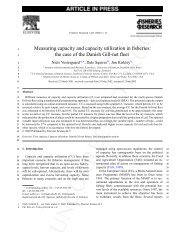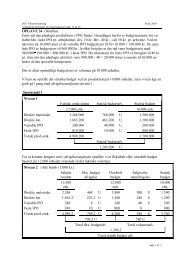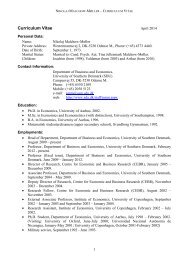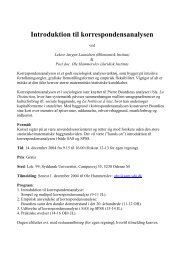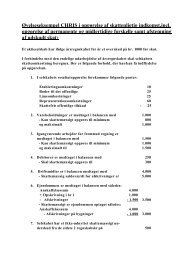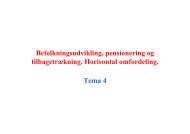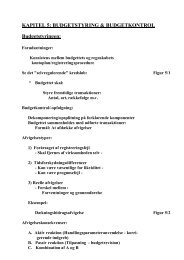election defeat more cooperation <strong>and</strong> unification was needed. The victory <strong>of</strong> SLD <strong>and</strong> PSL at the1993 election had primarily been due to the deep split among right-w<strong>in</strong>g parties at both actor <strong>and</strong>policy level.Due to the formation <strong>of</strong> the election alliance AWS the trade union Solidarity aga<strong>in</strong> becamerepresented <strong>in</strong> parliament <strong>and</strong> <strong>in</strong> the government at the 1997 election. Most lead<strong>in</strong>g personalitiesfrom Solidarity were elected to the parliament; some became m<strong>in</strong>isters <strong>in</strong> the Buzek-government.Marian Krzaklewski was elected as the chairman for AWS’ parliamentary group. Soon after theelection the characteristics <strong>of</strong> political movement disappeared. In the trade union Solidarity theposition <strong>of</strong> Krzaklewski was stronger than <strong>in</strong> the case <strong>of</strong> Walesa, for opposite Marian Krzaklewski,former chairman Lech Walesa had to fight energetically to keep his post as chairman <strong>of</strong> Solidarity.Just opposite, under Krzaklewskis rule the elections <strong>and</strong> decisions took place top-down accord<strong>in</strong>g towell-prepared plans. Hav<strong>in</strong>g taken over government responsibilities Solidarity appealed to”responsibility” <strong>and</strong> “self-limitation” among the trade union members <strong>and</strong> had to defend itselfaga<strong>in</strong>st critique <strong>of</strong> the cooperation with the liberal <strong>and</strong> more secular Freedom Union (UW).The trade union Solidarity year 2000-2001 was different from the broad social movement <strong>in</strong> the1980’s. The catch-all character was ma<strong>in</strong>ta<strong>in</strong>ed, but at the same time also a move <strong>in</strong> the direction <strong>of</strong>a post-communist cartel party formation has been observed. Accord<strong>in</strong>g to many observers <strong>of</strong>Solidarity the congress <strong>in</strong> autumn 1998 was evident <strong>of</strong> the petrification <strong>and</strong> bureaucratisationprocess <strong>and</strong> concentration <strong>of</strong> power to a narrow circle <strong>of</strong> the chairman (Krzaklewski) with too muchfocus on the “technology <strong>of</strong> power”. The congress <strong>in</strong> 1998 took place shortly after the victory overthe ”post-communists”, for that reason the enthusiasm among the delegates was great. LechWalesa's critical remarks directed aga<strong>in</strong>st the new government were not accepted by a majority <strong>of</strong>the delegates.The situation before the next 1999 congress had changed. The fact that the 1999 congress tookplace at the time when the support <strong>of</strong> AWS <strong>and</strong> the government was decreas<strong>in</strong>g gave rise to sharpcritique directed aga<strong>in</strong>st the policy <strong>of</strong> the AWS-UW government, e.g. the privatisation policy, thetax policy <strong>and</strong> the postponement <strong>of</strong> the law about 40 hours work<strong>in</strong>g week with Saturday as workfree day. Nonetheless, this time <strong>in</strong> his speech to the 1999 congress former president Lech Walesakept a low pr<strong>of</strong>ile. His proposal about lett<strong>in</strong>g the first round <strong>of</strong> the forthcom<strong>in</strong>g presidential electionbecame an American type primary election with himself as one <strong>of</strong> the c<strong>and</strong>idates was not acceptedby the majority <strong>of</strong> the delegates. With the negative experience from the presidential election <strong>in</strong> 1995<strong>in</strong> m<strong>in</strong>d, the majority expressed the op<strong>in</strong>ion that the political right should be presented by onecommon c<strong>and</strong>idate with the aim to place the common c<strong>and</strong>idate <strong>in</strong> the strongest possible position <strong>in</strong>the struggle aga<strong>in</strong>st the post-communist c<strong>and</strong>idate, the then act<strong>in</strong>g president Alex<strong>and</strong>erKwasniewski.2.6. The foundation <strong>of</strong> AWSThis section will elaborate on the formation, stabilization <strong>and</strong> demise <strong>of</strong> the electoral alliance AWS.The <strong>in</strong>itiative to establish the election alliance AWS shall be seen <strong>in</strong> the context <strong>of</strong> the defeat at the1993 election <strong>and</strong> the presidential election <strong>in</strong> 1995. At the presidential election 1995 the right w<strong>in</strong>gparties were divided <strong>in</strong> several small parties, thereby contribut<strong>in</strong>g to the ”post-communist”Alex<strong>and</strong>er Kwasniewski's victory at the presidential election. At the presidential election <strong>in</strong> 1995Solidarity supported Lech Walesa. However, other right w<strong>in</strong>g groups took the decision to supportc<strong>and</strong>idates from their own political groups. Thus PC (”Porozumienie Centrum”) supported Lech54
Kaczynski, ROP Jan Olszewski <strong>and</strong> ZChN Hanna Gronkiewicz-Walz. In Solidarity a group led byZbigniew Wrzodak broke the party l<strong>in</strong>e <strong>and</strong> supported Jan Olszewski. Thus, evidence showed thatwithout greater unity on the Right the “power monopoly” <strong>of</strong> the post-communist would not bebroken.22 different parties <strong>and</strong> organizations subscribed the declaration <strong>of</strong> the creation <strong>of</strong> Election ActionSolidarnosc (AWS), at the 1997 election AWS was composed <strong>of</strong> no less than 38 different parties<strong>and</strong> organisations. As noted earlier, AWS can best be considered as a negative alliance, first as anembryonic, later as a proto-political party with trade union Solidarity as the organizational core.Dur<strong>in</strong>g the election campaign the attempt to mobilise the old Solidarity ethos succeeded to a largeextent, <strong>and</strong>, most important, the waste <strong>of</strong> votes was substantially reduced. At the 1993 electionthose groups, which later formed AWS, had obta<strong>in</strong>ed 29 pct. <strong>of</strong> the votes, only 4 pct. less than at the1997 election, but at the 1997 election enough for the Right to obta<strong>in</strong> the majority <strong>in</strong> parliament. Asthe right w<strong>in</strong>g “The Movement for Build<strong>in</strong>g UP Polan” (ROP) lost votes to AWS the real sw<strong>in</strong>g tothe Right was rather modest.The liberal Freedom Union (UW), still work<strong>in</strong>g outside AWS, constituted the social liberal parts <strong>of</strong>the Solidarity movement The Workers Union (UP), the centre-left orientated part <strong>of</strong> Solidarity hasbeen supported by reform-m<strong>in</strong>ded former communists. Nevertheless at the 1997 election AWSbecame the greatest s<strong>in</strong>gle party with support from about one third <strong>of</strong> the electorate, more thanpredicted <strong>in</strong> the op<strong>in</strong>ion polls before the election which showed almost “dead heat” between left <strong>and</strong>right.Thus, from the outset AWS can be considered as a broad right w<strong>in</strong>g negative election alliance, withstrong elements <strong>of</strong> anti-politics, without the old “self-limitation” <strong>and</strong> with close l<strong>in</strong>ks to thepresident (Walesa) <strong>and</strong> with strong support from the army <strong>and</strong> the church hierarchy.2.7. The organisational structure <strong>of</strong> AWSFrom the outset AWS’ different political groups <strong>and</strong> ”legs” watched zealously over their ownidentity. Several acted as veto-groups even obstruct<strong>in</strong>g even already adopted decisions <strong>and</strong> preventpassage <strong>of</strong> new. The prospects to form one united right w<strong>in</strong>g party with a high <strong>in</strong>stitutionalisation<strong>and</strong> a common party culture were dark. Plans circulat<strong>in</strong>g <strong>in</strong> the spr<strong>in</strong>g 1995 to create an”<strong>in</strong>dependent trade union party” – only based on the trade union Solidarity - were impossible tocarry through. The experience from the 1993 election, where the trade union Solidarity lost all theseats <strong>in</strong> parliament, was frighten<strong>in</strong>g. The right w<strong>in</strong>g parties were simply ”doomed to cooperate”.As noted above, the trade union Solidarity was AWS’ organisational nucleus <strong>and</strong> MarianKrzaklewski the political front figure. Tactical considerations, not ideological unity, were mostdecisive. The different political groups on the Right could easily agree on the anti-communistorientation with the aim to remove the ”post-communists” from power. Many <strong>in</strong> AWS expressedthe op<strong>in</strong>ion that the round table decisions gave the ”post-communists” too much political <strong>in</strong>fluence.Also the support to the church was strong, e.g. <strong>in</strong> questions about abortion <strong>and</strong> religious <strong>in</strong>struction<strong>in</strong> schools. The close l<strong>in</strong>ks to the church not only separated Solidarity from the ”post-communists”,but also Solidarity from its coalition partners, e.g. liberals <strong>and</strong> moderates <strong>in</strong> the Freedom Union”(UW).55
- Page 3: “This provisional situation chara
- Page 6 and 7: marketisation and privatisationshor
- Page 8 and 9: purposes, are channels for “expre
- Page 10 and 11: the significance of strategic choic
- Page 12 and 13: presidentialism gave rise to “flo
- Page 14 and 15: antipolitics and reinforcement of a
- Page 16 and 17: In the late 1990’s elections most
- Page 18 and 19: determined primarily by “politica
- Page 20 and 21: politics and antipolitics, all sign
- Page 22 and 23: which attitudes to state regulation
- Page 24 and 25: Anti-communism has been defined in
- Page 26 and 27: elections and the Slovak communists
- Page 28 and 29: Cartel agreementsbetter representat
- Page 30 and 31: Basically the absence of clear cons
- Page 32 and 33: After 1989 different types of polit
- Page 34 and 35: complex project for transition unde
- Page 36 and 37: window of opportunity in spite of s
- Page 38 and 39: analyses of party institutionalizat
- Page 40 and 41: political messages and slogans. Thu
- Page 42 and 43: well established party culture may
- Page 44 and 45: expected, much due to the many spli
- Page 46 and 47: Furthermore, the polarisation on el
- Page 48 and 49: Finally, Solidarity can also be con
- Page 50 and 51: whole, on the one side an authorita
- Page 52 and 53: The economic recession and the grav
- Page 56 and 57: The formation of AWS can be conside
- Page 58 and 59: group. RS AWS constituted the Chris
- Page 60 and 61: According to the original plans the
- Page 62 and 63: values. According to Rybicki, as so
- Page 64 and 65: AWS should fight against all types
- Page 66 and 67: 2001 parliamentary election, howeve
- Page 68 and 69: and workers voted ZChN. At the 1993
- Page 70 and 71: The League has been considered as a
- Page 72 and 73: establishment like than LPR’s. Th
- Page 74 and 75: jobs in rural areas, especially sma
- Page 76 and 77: industrial policy. According to the
- Page 78 and 79: pressurizing the government to give
- Page 80 and 81: democrats, thereby locating itself
- Page 82 and 83: To conclude, the Freedom Union (UW)
- Page 84 and 85: Polish middle class. Thus, in Janua
- Page 86 and 87: such as KSCM and KSS in The Czech R
- Page 88 and 89: The SLD leaders were mainly recruit
- Page 90 and 91: the falling popular support for pri
- Page 92 and 93: innovation was formation of the pol
- Page 94 and 95: place after talks with each applica
- Page 96 and 97: Has the Left any freedom of manoeuv
- Page 98 and 99: medicine, changes in the labour cod
- Page 100 and 101: The Labour Union (UP), Democratic U
- Page 102: Nevertheless, before that had taken



